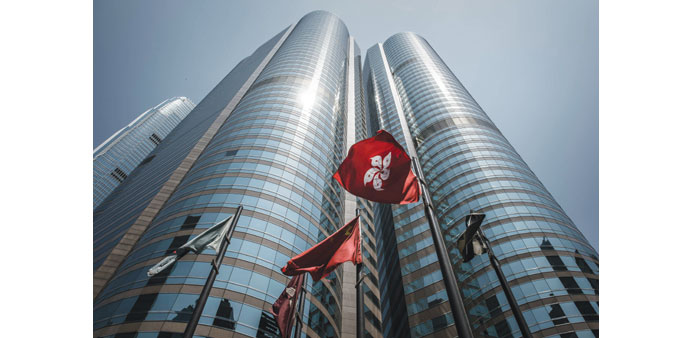A frontal view of the Hong Kong Exchanges & Clearing building. The HKEx soared 80% this year through a May peak before a 35% drop erased $16bn in market capitalisation, more than the entire value of the London Stock Exchange.
Bloomberg
Hong Kong
The outlook for Hong Kong’s exchange operator is dimming after the wildest year for its investors since 2008.
So say analysts at Haitong International Securities Group and Morgan Stanley who have sell calls on Hong Kong Exchanges & Clearing.
They’re not alone, with the proportion of analysts making similar recommendations rising this month to the highest since November 2013. HKEx soared 80% this year through a May peak before a 35% drop erased $16bn in market capitalisation, more than the entire value of London Stock Exchange Group.
The conditions that drove HKEx to a record seven months ago - a surge in turnover through the Shanghai bourse partnership and global investor appetite for companies with business in China - are working against it now.
Trading volumes have dwindled along with excitement about a planned extension of the mainland link to Shenzhen. Valuations on the benchmark Hang Seng Index are at similar levels to shares in Pakistan as China’s economic slowdown and higher borrowing costs in the city weigh on the outlook for earnings.
“It’s definitely more likely that turnover will go back to historical levels and the HKEx will see earnings decline,” said Tony Tanaka, an analyst at Haitong International, a unit of China’s third-largest broker by market value. “In 2016, even if the multiple stays where it is right now, earnings will decrease so share prices will have to drop, unless the multiple expands further which I don’t think is very likely.”
Many of his peers have also turned downbeat. Goldman Sachs Group, which was among the most bullish in April on the stock among brokerages tracked by Bloomberg, says the shares will fall 13% over the next 12 months.
Morgan Stanley cut its rating to underperform in a note on November 30, saying HKEx was expensive. The stock rose 1.4% to HK$202.80 at yesterday’s close in Hong Kong.
The operator of the world’s fourth-largest stock market trades at 29 times estimated earnings, about three times the level of the Hang Seng Index and a 61% premium to a measure of equal-weighted security and commodity exchanges around the world tracked by Bloomberg.
Average daily turnover on the bourse this quarter has slumped to HK$75bn, less than half the average of the three months through June and the lowest since the third quarter of last year, before the Shanghai link began.
About 70% of HKEx’s revenue is related to trading volumes, China International Capital Corp said earlier this year.
Turnover surged to a record on April 9 after mainland investors maxed out a quota for buying Hong Kong stocks for the first time, spurring speculation the city’s stocks would be buoyed by a flood of money from across the border. The Hang Seng Index climbed the most in six years that month, while HKEx jumped 56%.
“Expectations were too high,” said Steven Leung, an executive director for institutional sales at UOB Kay Hian (Hong Kong) in Hong Kong. “HKEx has been the proxy for the overall Hong Kong market.”
HKEx is diversifying its earnings through its commodities unit London Metal Exchange, and that should help support the shares, according to Daniel So, a strategist with CMB International Securities in Hong Kong. LME’s contribution accounted for 19% of revenue and other income in the first half.
Half of the 24 analysts tracked by Bloomberg have a buy rating on the stock, down from 65% in April, while six advise selling and another six have a neutral recommendation.
Shares will gain 12% over the next 12 months, according to the consensus of analyst targets.
HKEx declined to comment on analyst ratings. The Shenzhen link is expected to start next year, while there’s been increased buying of Hong Kong equities by Chinese investors since October as the valuation gap between the city’s stocks and mainland peers widened.
The bourse operator’s share price already factors in all the positive news, says Ben Kwong, a director at brokerage KGI Asia in Hong Kong, who predicts shares may fall a further 15% if turnover stays at similar levels and new share sales lose momentum.
At a market value of $31bn, HKEx is just behind CME Group in the rankings of the world’s largest exchange operators.
“2015 was an exceptionally great year,” said Haitong’s Tanaka. “When turnover recovered the profit just grew, so earnings per share was growing every year. It’s certain that 2016 will be a decline from 2015.”

